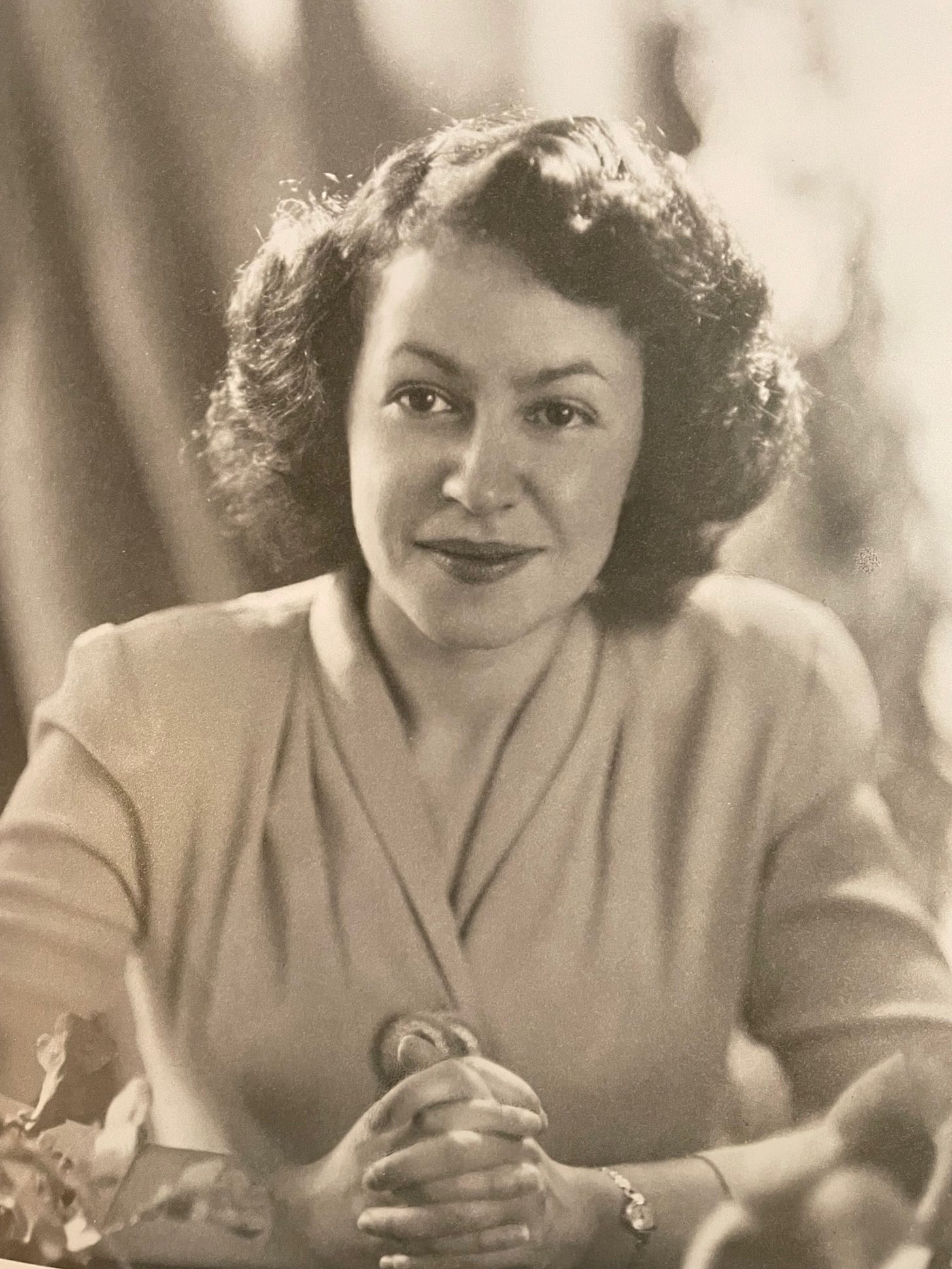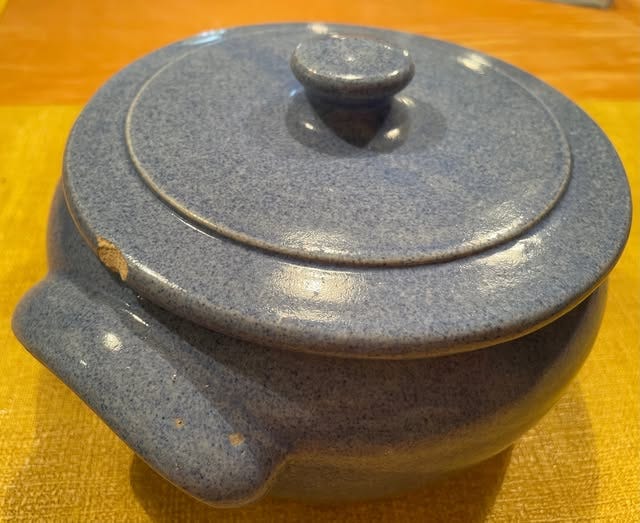Love Bids You Welcome
The friend you need most could be the quiet one who pours tea and listens.
Today I’m duetting with my mother, Fredelle Maynard—author, literary scholar and my first writing mentor. Her letters contain her most vivid storytelling. Some of you have come to love her through the gems I’ve quoted in the past. You’re about to experience peak Fredelle at one of those heart-stretching passages we all face in midlife and beyond.
The blue ceramic dish once belonged to my mother's friend Rose, her senior by some 30 years. It was already chipped when Fredelle brought it home, thinking I could use it in my newlywed's kitchen. The dish has sat untouched in every one of my kitchens. Long ago a cold flattened all the Maynards, and Rose dropped off a casserole. She might have tucked it into the blue dish.
My mother always browned her brisket until it crisped at the corners. She scented her famous chicken soup with generous handfuls of dill. When Rose’s offering arrived, Mother tucked it in the fridge without a glance and spent the afternoon in bed. A day without cooking. What luck.
At dinner time she opened Rose’s dish and found a concoction she described with gleeful horror in a letter to her parents: “…cooked macaroni, very pale and white. A little milk had been poured over it, and three little circles of cheese sat in dead center. The whole thing had then been liberally sprinkled with wheat germ, for extra goodness. To round out the meal there was a quivering dish of prune jelly.”
Cooking didn’t interest Rose. People did. She took understated pleasure in making strangers welcome. When Fredelle arrived in our staid New Hampshire town—conspicuously Jewish and ambitious, missing her friends from grad school days, adrift at Tupperware parties—Rose mothered her with tea and biscuits. Unlike my grandmother, who waited in Winnipeg for news of accomplishments to kvell about, Rose asked nothing of Fredelle except friendship.
Sometimes I’d be dragged along to the dark little house where Rose taught piano and waited on her husband Charlie. An imperious bulldog of a man, all barrel chest and bark, he had once made a pass at my mother. From another letter: “Why, I flush to think of it—a man of his age!”
Rose had married too late for children. She wore no makeup, shared no gossip and served no cookies that didn’t come from a package. I wondered what my mother saw in anyone so unconcerned with beauty or adventure, so tolerant of odious Charlie. Rose’s gentleness went over my head like a cloud.
My mother wasn’t gentle. She bristled with resentment. The University of New Hampshire hired mediocre men to teach, but not a Radcliffe PhD who happened to be a woman with two children. The year I turned 15, she called the family to the table and stormed out of the house when we declined to leave the TV. She had lavished her day on a multi-course dinner, and this was all the gratitude she got? My mother had just read The Feminine Mystique. She stayed gone all evening while the rest of us dined on sandwiches, an inconceivable lapse in standards. Years passed before she told me where she’d been. She turned to Rose.
My mother’s bond with Rose had none of the drama that infused her other friendships. Claire wept in our kitchen for a doomed love affair, Marion lamented poverty and writer’s block, Joan agonized over her misbegotten marriage. Rose took her cares to Quaker meetings where the congregation sat in silence, listening for messages from God. Friends, they called themselves. With a capital F.
If you had asked me to name my mother’s closest friends, Rose would not have made the list. Yet when Rose died of liver cancer, at 78, my mother reeled. She wrote to me in Toronto, where I had just moved into a walk-up apartment with the man who became my husband. I read her letter on the landlord’s scratchy couch as my mother’s love for Rose broke over me.
Strange, until two weeks ago I couldn’t believe the diagnosis, at least didn’t feel it on my pulses. Though she stayed in bed, and was clearly very weak, her eyes were bright, her talk precise and witty… I kept thinking there must be a mistake…. When, a few days before she died, I tried to give her the milk she had asked for, she could not suck it through a straw, or even sip from a spoon. But plucky! On almost the last day, she whispered to [her stepson], “How long will it be?” He pretended not to understand the question, and she said, “Come on, let’s not be mawkish!”
One truly memorable occasion: a Quaker meeting in Rose’s hospital room, when it became clear that she would never leave it. A small group, maybe 15. Several young men in jeans with beards and Biblical faces, some old, old people, one child—all absolutely silent for maybe half an hour. The sense of people thinking and feeling together was very strong, like a spell…. A young woman said, “O Lord that art within us, thank you for the goodness you have given us through Rose,” and someone else said, slowly, almost wonderingly, “Friend. What a beautiful word. She is my friend. You are my friend. You are ALL my friends.”
At one point Rose spoke from the bed—she had by then lost her vision almost completely, and her voice was barely audible: “I thank the giver of all gifts for love, which is the greatest gift of all.” And then one of the Biblical young men suddenly burst into song: “MY LORD WHAT A MORNING, WHEN THE STARS BEGIN TO FALL!”
Afterwards, Rose spoke individually to every person (we had to identify ourselves, for she couldn’t see), with the same grace and interest that she always showed in her own home, as hostess. I had quoted a poem of Herbert’s (“Love bade me welcome, yet my soul drew back”); she asked whose poem it was, and could she have a copy, there was so much in it she would like to think about…. We both knew she would not be reading any more poems, but it was, well, in the best sense of the word STYLISH….
The last time I visited, I found her whispering to herself. She looked like death, as light and dry as dandelion fluff. She reached up and straightened her wig, which was askew, and said—with a rueful little smile, “Excuse me. I was just ruminating.” Within minutes, she seemed to lose the capacity for speech, but was struggling to say something. I thought she wanted assistance of some sort, and bent over her so I could make it out. And what she said was, “Tell me what YOU have been doing.”
The poem my mother shared with Rose was a lot like Rose herself, unassuming and devoted in the fullest sense of the word. George Herbert, a 17th-century cleric, raises the curtain on a dinner for two: welcoming host, reluctant guest who feels unworthy of the feast. The guest’s excuse for holding back, “dust and sin,” is borderline arrogance veiled in humility. But the host does not waver. Graciousness carries the day in a line so simple, a kindergartner would get it: “So I did sit and eat.”
Herbert, an Anglican, served Communion. “Host,” to a believer, means the body of Christ. My Jewish mother followed no creed. She carried stinging memories of the schoolyard taunt: “You killed Christ!” Yet the poem spoke to her sense of otherness, her wavering confidence in the gifts that earned her doctorate from Radcliffe. She once wrote to a friend from those days, “In the [Radcliffe] period I was so terribly spoiled….I really thought I could do anything and have everything. I've come to see that my talents are really not very considerable.” Herbert’s poem, like Rose’s friendship, was a tonic. She heard the invitation to accept love freely offered by those who stand beside us, even when we run from ourselves.

I used to wonder what Rose told my mother, that night she fled her kitchen. As Charlie’s ever-patient wife, did she recommend submission to the norms of the time?
I imagine the scene. My mother’s hand quivers on the knocker. She’d better not be interrupting dinner. As it happens, Rose is washing up. Would Fredelle prefer tea or something stronger?
Rose serves sherry in heirloom crystal. Opens a fresh box of cookies. Listens as Fredelle pours out her tale. Whatever Rose says would fit on a postcard. As darkness falls, she lets it penetrate the room. Shadows enclose host and guest like a forest known only to themselves.
My mother holds a cookie to her lips. It tastes of nothing except love. She is somewhere around 43, just beginning to write the stories that will one day become her first book. She inhales Rose’s steadying presence. When the time comes to gather herself, she knows her friend is not the hugging kind. Rose has touched a hidden softness in her that that opens like a bud. It will see her home.
Have you ever loved a friend for steadfast listening? Or a poem for its gentle tap on your shoulder when your courage fails? I’m listening—along with a tribe of friends, new and old, who gather here to learn from one another.
Take this conversation anywhere you’re moved to go. Amazement Seeker is a rule-free zone.
And here is “My Lord, What a Morning,” recorded in 1962 by Joan Baez, whose commitment to peaceful non-violence took root in a Quaker home. She told Krista Tippett last year, “What stayed with me in the end was the silence, and it’s been a part of my life — an important part of my life — ever since.”
You’re invited to browse my archives and share. All my essays are free to enjoy. I welcome all readers and love meeting you here. If you’ve been loving my work for a while, this might be time to join my team of champions as a paying subscriber. Love: It’s the only reason. That’s why every paid subscription arrives like a rainbow.






What a beautiful collaboration, Rona. "She looked like death, as light and dry as dandelion fluff." Fredelle nailed it with that sentence. It took my breath away in its clarity. Friends are the gift of life for sure. With friendship, there's love of all different kinds. I rely on it, and hold my friends as chosen family. They are the people who accept me as I am, and love me because of it. They don't want to fix me, they just see me. Thanks for being my friend. xo
When my late husband died, his best friend (a Native American woman, although she used the term Indian) read the poem Do Not Weep For Me at our makeshift funeral. It was just the two of us standing in his barn and, of course, all I did after she read it was weep. I wrote about her and the gift of her invented funeral at a time when I was so lost I couldn't manage any kind of memorial for him myself. Unfortunately, that essay, entitled "Cindian," was the end of our friendship. But I think of her and that moment in the barn every time I read the poem. As always, Rona, this was beautiful.